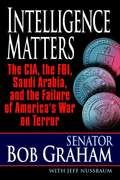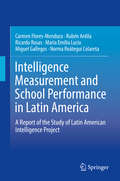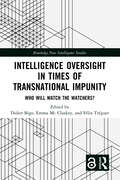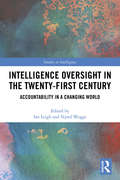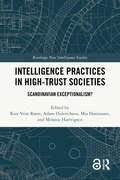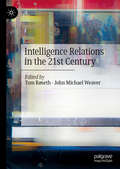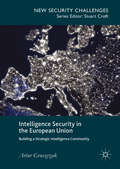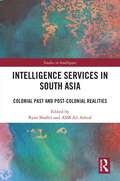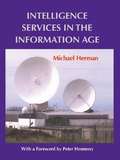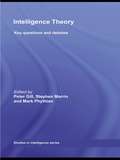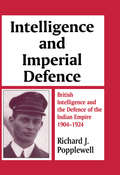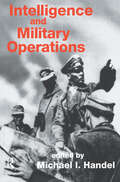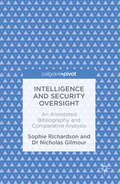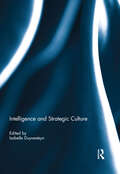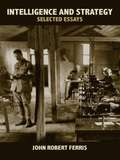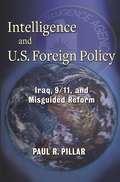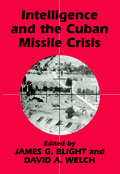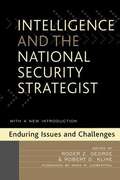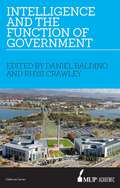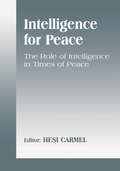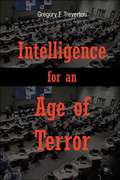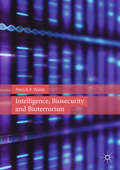- Table View
- List View
Intelligence Matters
by Senator Bob GrahamIn this explosive, controversial, and profoundly alarming insider's report, Senator Bob Graham reveals faults in America's national security network severe enough to raise fundamental questions about the competence and honesty of public officials in the CIA, the FBI, and the White House.For ten years, Senator Graham served on the Senate Intelligence Committee, where he had access to some of the nation's most closely guarded secrets. Following the attacks of September 11, 2001, Graham co-chaired a historic joint House-Senate inquiry into the intelligence community's failures. From that investigation and his own personal fact-finding, Graham discovered disturbing evidence of terrorist activity and a web of complicity:* At one point, a terrorist support network conducted some of its operations through Saudi Arabia's U.S. embassy-and a funding chain for terrorism led to the Saudi royal family. * In February 2002, only four months after combat began in Afghanistan, the Bush administration ordered General Tommy Franks to move vital military resources out of Afghanistan for an operation against Iraq-despite Franks's privately stated belief that there was a job to finish in Afghanistan, and that the war on terrorism should focus next on terrorist targets in Somalia and Yemen.* Throughout 2002, President Bush directed the FBI to limit its investigations of Saudi Arabia, which supported some and possibly all of the September 11 hijackers.* The White House was so uncooperative with the bipartisan inquiry that its behavior bore all the hallmarks of a cover-up.* The FBI had an informant who was extremely close to two of the September 11 hijackers, and actually housed one of them, yet the existence of this informant and the scope of his contacts with the hijackers were covered up.* There were twelve instances when the September 11 plot could have been discovered and potentially foiled.* Days after 9/11, U.S. authorities allowed some Saudis to fly, despite a complete civil aviation ban, after which the government expedited the departure of more than one hundred Saudis from the United States.* Foreign leaders throughout the Middle East warned President Bush of exactly what would happen in a postwar Iraq, and those warnings went either ignored or unheeded.As a result of his Senate work, Graham has become convinced that the attacks of September 11 could have been avoided, and that the Bush administration's war on terrorism has failed to address the immediate danger posed by al-Qaeda, Hezbollah, and Hamas in Afghanistan, Syria, Yemen, and Somalia. His book is a disturbing reminder that at the highest levels of national security, now more than ever, intelligence matters.From the Hardcover edition.
Intelligence Measurement and School Performance in Latin America: A Report of the Study of Latin American Intelligence Project
by Carmen Flores-Mendoza Rubén Ardila Ricardo Rosas María Emilia Lucio Miguel Gallegos Norma Reátegui ColaretaThis book presents the results of the most complete and updated assessment of cognitive resources of students in Latin America: the Study of Latin American Intelligence (SLATINT). During four years, top researchers of the region used a standardized set of cognitive measures to assess 4,000 students aged between 14 and 15 years from six countries: Brazil, Argentina, Mexico, Chile, Colombia and Peru. The data collected and now analyzed in this volume is a first step to understand the human cognitive capital of the region, a crucial resource for any country today. Intelligence research has shown that the cognitive skills of a population are strongly associated with the school performance of its students and the development of a nation. This makes Intelligence Measurement and School Performance in Latin America a valuable tool both for Latin American researchers and authorities engaged in the improvement of each country’s human resources and for psychologists, educators and other social scientists dedicated to the study of the impact of intelligence in the development of nations.
Intelligence Oversight in Times of Transnational Impunity: Who Will Watch the Watchers? (Routledge New Intelligence Studies)
by Didier Bigo Emma Mc Cluskey Félix TréguerThis book adopts a critical lens to look at the workings of Western intelligence and intelligence oversight over time and space. Largely confined to the sub-field of intelligence studies, scholarly engagements with intelligence oversight have typically downplayed the violence carried out by secretive agencies. These studies have often served to justify weak oversight structures and promoted only marginal adaptations of policy frameworks in the wake of intelligence scandals. The essays gathered in this volume challenge the prevailing doxa in the academic field, adopting a critical lens to look at the workings of intelligence oversight in Europe and North America. Through chapters spanning across multiple disciplines – political sociology, history, and law – the book aims to recast intelligence oversight as acting in symbiosis with the legitimisation of the state’s secret violence and the enactment of impunity, showing how intelligence actors practically navigate the legal and political constraints created by oversight frameworks and practices, for instance by developing transnational networks of interdependence. The book also explores inventive legal steps and human rights mechanisms aimed at bridging some of the most serious gaps in existing frameworks, drawing inspiration from recent policy developments in the international struggle against torture. This book will be of much interest to students of intelligence studies, sociology, security studies, and international relations. The Open Access version of this book, available at www.taylorfrancis.com, has been made available under a Creative Commons Attribution-Non Commercial-No Derivatives 4.0 license.
Intelligence Oversight in the Twenty-First Century: Accountability in a Changing World (Studies in Intelligence)
by Ian Leigh Njord WeggeThis book examines how key developments in international relations in recent years have affected intelligence agencies and their oversight. Since the turn of the millennium, intelligence agencies have been operating in a tense and rapidly changing security environment. This book addresses the impact of three factors on intelligence oversight: the growth of more complex terror threats, such as those caused by the rise of Islamic State; the colder East-West climate following Russia’s intervention in Ukraine and annexation of Crimea; and new challenges relating to the large-scale intelligence collection and intrusive surveillance practices revealed by Edward Snowden. This volume evaluates the impact these factors have had on security and intelligence services in a range of countries, together with the challenges that they present for intelligence oversight bodies to adapt in response. With chapters surveying developments in Norway, Romania, the UK, Belgium, France, the USA, Canada and Germany, the coverage is varied, wide and up-to-date. This book will be of much interest to students of intelligence studies, security studies and International Relations.
Intelligence Practices in High-Trust Societies: Scandinavian Exceptionalism? (Routledge New Intelligence Studies)
by Kira Vrist Rønn Adam Diderichsen Mia Hartmann Melanie HartvigsenThis book examines the dynamics of intelligence practices in the Scandinavian culture of high social cohesion and high trust.Situated within the new body of scholarly literature, the book emphasizes critical empirical investigations of intelligence practices, highlighting the specific cultural settings of such practices. By providing Scandinavian perspectives on intelligence studies, the work distinguishes Scandinavian intelligence studies from the predominant Anglo-American perspectives. Throughout the Western world, the past two decades have generated a rapid expansion of the legal mandate, funding, and capabilities of intelligence agencies which, simultaneously, have been pushed to renegotiate and renew their legitimacy and democratic mandate in response to a recurrent pattern of scandals, leaks, and failures. While these tendencies are also evident in Scandinavia, the book argues that it is important to emphasize the unique context of cohesion and trust in state agencies that differentiates Scandinavian welfare states from the American (and to a lesser extent British) contexts. This book brings together scholars from Norway, Sweden, and Denmark to address the continuous renegotiation of the legitimacy of state intelligence as it plays out in a Scandinavian setting.This book will be of interest to students of intelligence studies, Nordic politics, security studies, and International Relations.
Intelligence Relations in the 21st Century
by Tom Røseth John Michael WeaverThis book analyzes intelligence relations in an unsecure world and provides contributions on intelligence processes, interstate intelligence relations and hybrid warfare. Tactical, operational and strategic intelligence relations, both within and between intelligence agencies, and between states, are essential to support decision makers. This book ties together how intelligence adapts to security changes, global power shifts and the trend from globalization to a more nationalistic approach. During such changes, there is a need to analyze intelligence sharing relationships. Bringing together practitioners and academics, the book presents a plurality of approaches relative to intelligence relations that seek to advance the debate in the field.
Intelligence Security in the European Union
by Artur GruszczakThis book investigates the emergence of an EU strategic intelligencecommunity as a complex multi-dimensional networkedconstruction. It examines the constitution, structure and performance of EU intelligence arrangementsas part of security policies of the European Union. Intelligence security has become a remarkable feature of the Europeanintegration processes. This study assess the ability of EU Member States, as well asrelevant institutions and agencies, to develop effective, legitimate andaccountable institutions and mechanisms for collection, transmission,processing and exchange of intelligence. In this regard, synergy is a keyindicator that validates the ability to create the European strategicintelligence community in the EU's legal and institutional framework. This groundbreakingproject constructs a comprehensive model of the intelligence community as adistorted epistemic community tailored to singularities of EU security policiesand systemic arrangements provided by EU institutions and agencies.
Intelligence Services in South Asia: Colonial Past and Post-Colonial Realities (Studies in Intelligence)
by Ryan Shaffer Asm Ali AshrafThis book explores colonial and post-colonial intelligence services in South Asia. It traces the genealogy of the institutions to analyze changes and continuities throughout the region.The volume also provides a framework for analyzing how intelligence services developed in these countries by looking at both internal and external issues, and shows how vital and sometimes interconnected these issues are for understanding intelligence in South Asia. It demonstrates how some countries and intelligence services borrowed from the colonial era and others started new institutions to protect national security in response to the shifting demands of the Cold War and post-Cold War era. Bringing together a group of international scholars, the anthology delves into the intelligence services of Afghanistan, Bangladesh, Bhutan, India, the Maldives, Myanmar, Nepal, Pakistan and Sri Lanka and traces how these national services developed in similar and diverse ways.This book will be of much interest to students of intelligence studies, Asian politics, security studies and International Relations.
Intelligence Services in the Information Age (Studies In Intelligence Ser.)
by Michael HermanIntelligence was a central element of the Cold War and the need for it was expected to diminish after the USSR's collapse, yet in recent years it has been in greater demand than ever. The atrocities of 11 September and the subsequent "war on terrorism" now call for an even more intensive effort. Important questions arise on how intelligence fits into the world of increased threats, globalization and expanded international action. This volume contains the recent work on this subject by Michael Herman, British intelligence professional for 35 years and Oxford University academic. It compares intelligence with other government information services, and discusses the British intelligence system and the case for its reform. It also addresses the ethical issues raised by intelligence's methods and results: "do they on balance make for a better world or a worse one?". Other chapters explore a wide range of intelligence topics past and present, including the transatlantic relationship, the alliance strategies of Norway and New Zealand, Mrs Thatcher's "de-unionization" of British Sigint, and personal memories of the British Cabinet Office in the 1970s.Michael Herman argues for intelligence professionalism as a contribution to international security and for its encouragement as a world standard. The modern challenge is for intelligence to support international cooperation in ways originally developed to advance national interests, while at the same time developing some restraint and international "rules of the game", in the use of intrusive and covert methods on its traditional targets. The effects of 11 September on this challenge are discussed in a thoughtful afterword.
Intelligence Theory: Key Questions and Debates
by Peter Gill Mark Phythian Stephen MarrinThis edited volume brings together a range of essays by individuals who are centrally involved in the debate about the role and utility of theory in intelligence studies. The volume includes both classic essays and new articles that critically analyse some key issues: strategic intelligence, the place of international relations theory, theories of
Intelligence Wars: American Secret History from Hitler to al-Qaeda
by Thomas PowersDescribes covert operations since World War II.
Intelligence and Imperial Defence: British Intelligence and the Defence of the Indian Empire 1904-1924 (Studies in Intelligence)
by Richard James Popplewell Richard J. PopplewellThis is the first book to appear on British intelligence operations based in both India and London, which defended the Indian Empire against subversion during the first two decades of the twentieth century. It is concerned with the threat to the British Raj posed by the Indian revolutionary movement, the resulting development of the imperial intelligence service and the role it played during the First World War.
Intelligence and Military Operations (Studies in Intelligence)
by Michael I. HandelTraditionally the military community held the intelligence profession in low esteem, spying was seen as dirty work and information was all to often ignored if it conflicted with a commander's own view. Handel examines the ways in which this situation has improved and argues that co-operation between the intelligence adviser and the military decision maker is vital.
Intelligence and Security Oversight
by Sophie Richardson Nicholas GilmourThisbook presents a comprehensive source document on intelligence and securityoversight and review. It compares the oversight arrangements found in ninecountries--New Zealand, Australia, Canada, United States, United Kingdom,Germany, Netherlands, Norway and South Africa. This is done through an analysisof a wide range of areas including statutory basis, agencies overseen,membership, tenure, appointment/dismissal, mandate, powers, access toclassified information, complaints function, reporting and, in the case ofparliamentary committees, the frequency of meetings. Within an annotatedbibliography section Richardson and Gilmour also provide detailed summaries ofother relevant research and commentary aligned with oversight and reviewpractices. Intelligence andSecurity Oversight: An Annotated Bibliography and Comparative Analysis comprehensivelydemonstrates the powers and limitations placed with, and on, oversight bodies,appealing to academics, researchers and practitioners in the intelligence andsecurity environment.
Intelligence and Strategic Culture
by Duyvesteyn IsabelleReliable information on potential security threats is not just the result of diligent intelligence work but also a product of context and culture. The volume explores the nexus between the intelligence process and strategic culture. How can and does the strategic outlook of the United States and the United Kingdom in particular, influence the intelligence gathering, assessment and dissemination process? This book contains an assessment of how political agendas and ideological outlook have significant influence on both the content and process of intelligence. It looks in particular at the premise of hearts and minds policies, culture and intelligence gathering in counterinsurgency operations; at case studies from imperial Malaya and Iran in the 1950s and at instances of intelligence failure, e.g. the case of Iraq in 2003. How was intelligence, or the lack thereof, a product of political culture and how did it play a role in the political praxis? The book shows that political agendas and the ideological outlook have a significant influence upon both the content and process of intelligence. This book was originally published as a special issue of Intelligence and National Security.
Intelligence and Strategy: Selected Essays (Studies in Intelligence)
by John FerrisJohn Ferris' work in strategic and intelligence history is widely praised for its originality and the breadth of its research. At last his major pioneering articles are now available in this one single volume. In Intelligence and Strategy these essential articles have been fundamentally revised to incorporate new evidence and information withheld by governments when they were first published. This volume reshapes the study of communications intelligence by tracing Britain's development of cipher machines providing the context to Ultra and Enigma, and by explaining how British and German signals intelligence shaped the desert war. The author also explains how intelligence affected British strategy and diplomacy from 1874 to 1940 and world diplomacy during the 1930s and the Second World War. Finally he traces the roots for contemporary intelligence, and analyzes intelligence and the RMA as well as the role of intelligence in the 2003 Gulf War.This volume ultimately brings new light to our understanding of the relations between intelligence, strategy and diplomacy between the end of the 19th century and the beginning of the 21st century.
Intelligence and U.S. Foreign Policy: Iraq, 9/11, and Misguided Reform
by Paul PillarA career of nearly three decades with the CIA and the National Intelligence Council showed Paul R. Pillar that intelligence reforms, especially measures enacted since 9/11, can be deeply misguided. They often miss the sources that underwrite failed policy and misperceive our ability to read outside influences. They also misconceive the intelligence-policy relationship and promote changes that weaken intelligence-gathering operations.In this book, Pillar confronts the intelligence myths Americans have come to rely on to explain national tragedies, including the belief that intelligence drives major national security decisions and can be fixed to avoid future failures. Pillar believes these assumptions waste critical resources and create harmful policies, diverting attention away from smarter reform, and they keep Americans from recognizing the limits of obtainable knowledge.Pillar revisits U.S. foreign policy during the Cold War and highlights the small role intelligence played in those decisions, and he demonstrates the negligible effect that America's most notorious intelligence failures had on U.S. policy and interests. He then reviews in detail the events of 9/11 and the 2003 invasion of Iraq, condemning the 9/11 commission and the George W. Bush administration for their portrayals of the role of intelligence. Pillar offers an original approach to better informing U.S. policy, which involves insulating intelligence management from politicization and reducing the politically appointed layer in the executive branch to combat slanted perceptions of foreign threats. Pillar concludes with principles for adapting foreign policy to inevitable uncertainties.
Intelligence and U.S. Foreign Policy: Iraq, 9/11, and Misguided Reform
by Paul R. PillarPaul R. Pillar's twenty-eight-year career with the CIA and the National Intelligence Council showed him that intelligence reforms, especially measures enacted since 9/11, can be deeply misguided. They often miss the sources underwriting failed policy and misperceive our ability to read outside forces. They misconceive the intelligence-policy relationship and promote changes that weaken intelligence-gathering operations. In this book, Pillar confronts the intelligence myths Americans have come to rely on to explain national tragedies, including the belief that intelligence drives major national security decisions and can be fixed to avoid future failures. These assumptions waste critical resources and create harmful policies, he claims, diverting attention away from smarter reform. They also refuse to recognize the limits of our knowledge. Pillar revisits U.S. foreign policy during the Cold War and highlights the small role intelligence played in those decisions, and he demonstrates the negligible effect America's most notorious intelligence failures had on U.S. policy and interests. He also reviews in detail the events of 9/11 and the 2003 invasion of Iraq, condemning the 9/11 commission and the George W. Bush administration for their portrayals of the role of intelligence. He offers an original approach to better informing U.S. policy, which involves insulating intelligence management from politicization and reducing the politically appointed layer in the executive branch that interjects slanted perceptions of foreign threats. Pillar concludes with principles for adapting foreign policy to inevitable uncertainty.
Intelligence and the Cuban Missile Crisis (Studies in Intelligence)
by James G. BlightThis is the first study to examine throughly the role of US, Soviet and Cuban Intelligence in the nuclear crisis of 1962 - the closest the world has come to Armageddon.
Intelligence and the National Security Strategist: Enduring Issues and Challenges
by Roger Z. George Robert D. KlineThis timely reissue of the 2004 edition (National Defense U. Press), with a new introduction by the assistant director of Central Intelligence for Analysis and Production, targets a broad audience. Based on a class at the National War College taught by the editors, this anthology of 39 previously published and new articles treats the evolution and structure of US intelligence and perspectives on controversial issues facing the intelligence community operating in a democracy. Appendices include the National Security Act and a summary of the beleaguered US Patriot Act. Not indexed. Annotation ©2006 Book News, Inc., Portland, OR (booknews.com)
Intelligence and the function of government
by Rhys Crawley Daniel BaldinoIntelligence plays an important, albeit often hidden hand, in the everyday function of government. Australia's intelligence agencies—collectively referred to as the Australian Intelligence Community (AIC)—are an established and fundamental component of the bureaucracy: they keep watch on potential problems in the name of national security, exploit weaknesses in the name of national interests, and build a picture of the complexities of the broader world for their consumers—other domestic government departments, partner intelligence agencies overseas and, most importantly, Australia's policy-makers. Their aim is to provide the government with 'information'—for that is essentially what intelligence is—to better enable it to tackle the issues confronting it; to be better armed, informed and forewarned of what might lay ahead; and to facilitate coherent policy-making. But we should not expect intelligence to be perfect, nor should we think that good intelligence guarantees good policy. This book draws on a wide range experts including academics, former and current strategic advisers and members of government, private industry professionals and intelligence community experts, to provide a diagnostic, clear-eyed approach in explaining, accessing and exposing the central foundations and frameworks necessary for effective practice of intelligence in Australia as well as the shaping of intelligence expectations.
Intelligence for Peace: The Role of Intelligence in Times of Peace (Studies in Intelligence)
by Hesi CarmelThis collection of articles is by experts in the field who are convinced that intelligence has an important role to play, not only in times of war and confrontation, but also in times of conciliation and political processes.
Intelligence for an Age of Terror
by Gregory F. TrevertonDuring the Cold War, U.S. intelligence was concerned primarily with states; non-state actors like terrorists were secondary. Now the priorities are reversed and the challenge is enormous. States had an address, and they were hierarchical and bureaucratic. They thus came with some 'story'. Terrorists do not. States were 'over there', but terrorists are there and here. They thus put pressure on intelligence at home, not just abroad. The strength of this book is that it underscores the extent of the change and ranges broadly across data collection and analysis, foreign and domestic, as well as presenting the issues of value that arise as new targets require collecting more information at home.
Intelligence power in peace and war
by Michael HermanIntelligence services form an important but controversial part of the modern state. Drawing mainly on British and American examples, this book provides an analytic framework for understanding the "intelligence community" and assessing its value. Michael Herman, a former senior British Intelligence officer, describes the various components of intelligence; discusses what intelligence is for; considers issues of accuracy, evaluation and efficiency; and makes recommendations for the future of intelligence in the post-Cold War world.
Intelligence, Biosecurity and Bioterrorism
by Patrick F. WalshThis book explores how potential bio-threats and risks may evolve post 9/11 given the rapid changes in biotechnology and synthetic biology. It also explores what role intelligence communities can play in understanding threats and risks. It argues that although bio-threats and risks are largely low probability and high impact in nature, intelligence in ‘Five Eyes’ countries remain insufficiently prepared to understand them. This book identifies key areas where intelligence reforms need to take place including a more strategic and systematic collaboration between national security/law enforcement intelligence and the scientific community. It is aimed at intelligence analysts, those in the scientific community working on health security threats, policy makers and researchers working on biosecurity and bioterrorism threats and risks.
